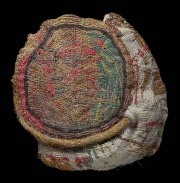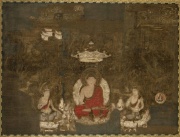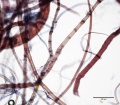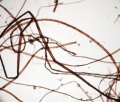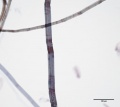Difference between revisions of "Bast fiber"
(username removed) |
|||
| (7 intermediate revisions by 3 users not shown) | |||
| Line 2: | Line 2: | ||
== Description == | == Description == | ||
| − | Strong, woody fibers obtained from the phloem tissues of many plants. Bast fibers are obtained from the stems and leaves of the plants. Examples of bast fibers are [ | + | Strong, woody fibers obtained from the phloem tissues of many plants. Bast fibers are obtained from the stems and leaves of the plants. Examples of bast fibers are [[flax]], [[hemp]], [[ramie]], [[jute]], [[abaca]], [[cantala]], [[henequen]], [[sisal]], [[pi%C3%B1a|pineapple]], [[ mitsumata]], [[gampi]], and [[kozo]]. Bast fibers are used for textiles, rope, and paper. |
[[File:11.6120-SC821.jpg|thumb|]] | [[File:11.6120-SC821.jpg|thumb|]] | ||
| + | |||
== Synonyms and Related Terms == | == Synonyms and Related Terms == | ||
| Line 11: | Line 12: | ||
== Comparisons == | == Comparisons == | ||
| − | [[ | + | [[File:Properties of Natural Fibers.pdf|Properties of Natural Fibers]] |
| + | |||
| + | == Other Properties == | ||
| + | Paper fiber type: non-woody/bast. Using transmitted light microscopy, bast fibers are identified by their prominent nodes, and long fibers. Width of the lumen varies with species. Appearance with [[Graff "C" stain]]: varies with species, but typically pinkish red due to high [[alpha cellulose]], nodes may stain red. Average dimensions of fibers: varies with species. Common pulping method: [[Soda]]. For specific paper fiber properties see: [[flax]], [[jute]], [[hemp]], [[ramie]], [[abaca]], and [[sisal]]. | ||
| + | ==Additional Images== | ||
| + | <gallery> | ||
| + | Hemp 40x2.jpg|Hemp paper pulp stained with Graff "C" stain | ||
| + | File:Flax 40x nodes bastshive.jpg|Flax paper pulp stained with Graff "C" stain | ||
| + | File:Ramie 40x striations.jpg|Ramie paper pulp stained with Graff "C" stain | ||
| + | Ramie 10x.jpg|Ramie paper pulp stained with Graff "C" stain | ||
| + | File:Abaca 40x.jpg|Abaca pulp stained with Graff "C" Stain | ||
| + | File:Jute40x.jpg|Jute fibers stained with Graff "C" stain | ||
| + | </gallery> | ||
| − | == | + | == Sources Checked for Data in Record == |
* Mary-Lou Florian, Dale Paul Kronkright, Ruth E. Norton, ''The Conservation of Artifacts Made from Plant Materials'', The Getty Conservation Institute, Los Angeles, 1990 | * Mary-Lou Florian, Dale Paul Kronkright, Ruth E. Norton, ''The Conservation of Artifacts Made from Plant Materials'', The Getty Conservation Institute, Los Angeles, 1990 | ||
Revision as of 14:30, 25 July 2016
Description
Strong, woody fibers obtained from the phloem tissues of many plants. Bast fibers are obtained from the stems and leaves of the plants. Examples of bast fibers are Flax, Hemp, Ramie, Jute, Abaca, Cantala, Henequen, Sisal, pineapple, Mitsumata, Gampi, and Kozo. Bast fibers are used for textiles, rope, and paper.
Synonyms and Related Terms
bast fibers; bast fibre (Br.); fibra blanda del folema (Esp.); fibra liberiana (Esp.); bastvezel (Ned); phloem fiber; pericyclic fiber; cortical fiber
Comparisons
Properties of Natural Fibers.pdf
Other Properties
Paper fiber type: non-woody/bast. Using transmitted light microscopy, bast fibers are identified by their prominent nodes, and long fibers. Width of the lumen varies with species. Appearance with Graff "C" stain: varies with species, but typically pinkish red due to high Alpha cellulose, nodes may stain red. Average dimensions of fibers: varies with species. Common pulping method: Soda. For specific paper fiber properties see: Flax, Jute, Hemp, Ramie, Abaca, and Sisal.
Additional Images
Sources Checked for Data in Record
- Mary-Lou Florian, Dale Paul Kronkright, Ruth E. Norton, The Conservation of Artifacts Made from Plant Materials, The Getty Conservation Institute, Los Angeles, 1990
- Hoechst Celanese Corporation, Dictionary of Fiber & Textile Technology (older version called Man-made Fiber and Textile Dictionary, 1965), Hoechst Celanese Corporation, Charlotte NC, 1990
- Rosalie Rosso King, Textile Identification, Conservation, and Preservation, Noyes Publications, Park Ridge, NJ, 1985
- The Dictionary of Paper, American Paper Institute, New York, Fourth Edition, 1980
- Bernard Toale, The Art of Papermaking, Davis Publications, Portland OR, 1983
- Walter C. McCrone, John Gustave Delly, The Particle Atlas, W. McCrone Associates, Chicago, IV, 1972
- Matt Roberts, Don Etherington, Bookbinding and the Conservation of Books: a Dictionary of Descriptive Terminology, U.S. Government Printing Office, Washington DC, 1982
- G.S.Brady, Materials Handbook, McGraw-Hill Book Co., New York, 1971 Comment: p. 333
- Van Nostrand's Scientific Encyclopedia, Douglas M. Considine (ed.), Van Nostrand Reinhold, New York, 1976
- Random House, Webster's Encyclopedic Unabridged Dictionary of the English Language, Grammercy Book, New York, 1997
- The American Heritage Dictionary or Encarta, via Microsoft Bookshelf 98, Microsoft Corp., 1998
- Art and Architecture Thesaurus Online, http://www.getty.edu/research/tools/vocabulary/aat/, J. Paul Getty Trust, Los Angeles, 2000
